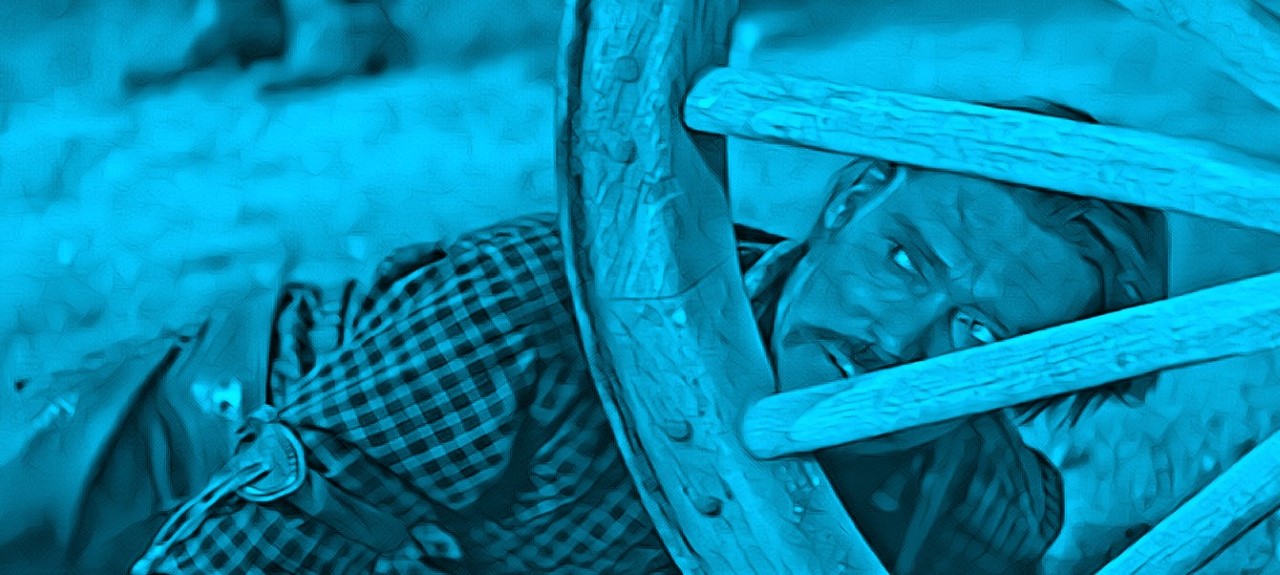As another Earps vs. Clantons gunfight at the O.K. Corral story, Tombstone is much closer to John Sturges’ Hour of the Gun than it is to Ford’s My Darling Clementine (#44), highlighting the rage and the many killings that followed in the aftermath. Narrated by Robert Mitchum the “good guys” are Kurt Russell (Wyatt Earp), Sam Elliott (Virgil Earp), Bill Paxton (Morgan Earp), and Val Kilmer (Doc Holliday) while the primary baddies are Powers Boothe (Curly Bill), Stephen Lang (Ike Clanton), Michael Biehn (Johnny Ringo), and Thomas Haden Church (Billy Clanton). The huge cast is rounded out by Dana Delany, Billy Zane, Michael Rooker, Jason Priestley, Billy Bob Thornton, Terry O'Quinn, John Corbett, Harry Carey Jr., and even a cameo by Charlton Heston. Made 118 years after the famous 30-second gunfight the original intent seems to have been to set the record straight (or at least straighter) after generations of myth building, some perpetrated by Wyatt Earp himself. Screenwriter Kevin Jarre (Glory) was to make his directorial debut, but a handful of days into production he was fired and replaced by the Italian George P. Cosmatos, best known for the Stallone actioners Cobra and Rambo: First Blood Part II. Recently it was revealed Cosmatos was such a volatile figure on set that Kurt Russell stepped in as the uncredited shadow director and several of his fellow actors credit him with saving the movie. Whoever should or shouldn’t get credit the resulting film is chock full of references to earlier Westerns, and if it aimed to be more historically accurate it succeeds only in further myth building.
Hitting the screens six months ahead of Lawrence Kasdan’s bigger budgeted and more serious Wyatt Earp, this rougher, more over-the-top version featuring an incredibly quirky and amusing performance by Kilmer is what has survived in the consciousness of filmgoers, including MoFo voters. Tombstone was on eighteen ballots with a first, three fifth, and two sixth place votes. It finished with the same point total as Mangold’s 3:10 to Yuma but by appearing on one more ballot it finishes one spot higher.
In the 1950s as television became such a dominant cultural force there were all sorts of predictions that very soon motion pictures were no longer going to be necessary. The Studios fought back against this sentiment by enhancing the cinematic experience including the introduction of various widescreen processes that would make going to the movies something that could not be duplicated at home. Westerns very quickly became the dominant form of drama on the television airwaves and William Wyler’s The Big Country is exactly the kind of production that aimed to outsize its broadcast cousins. A gigantic color canvas and an all-star cast are among the highlights of this tale of feuding cattle barons (Charles Bickford and Burl Ives), the woman (Jean Simmons) who owns the land with the key water source between the two properties, and the stoic former sailor from the east (Gregory Peck) who unintentionally stirs things up. The cast also includes Carroll Baker, Charlton Heston, Chuck Connors, and Alfonso Bedoya. Jerome Moross’ rousing symphonic score was nominated for an Oscar and Burl Ives won Best Supporting Actor. The kind of sweeping epic that they just don’t make anymore, The Big Country was on seventeen ballots including a tenth, three ninth, two fifth, a fourth, and somebody’s first place vote.
__________________
"Film is a disease. When it infects your bloodstream it takes over as the number one hormone. It bosses the enzymes, directs the pineal gland, plays Iago to your psyche. As with heroin, the antidote to Film is more Film." - Frank Capra
"Film is a disease. When it infects your bloodstream it takes over as the number one hormone. It bosses the enzymes, directs the pineal gland, plays Iago to your psyche. As with heroin, the antidote to Film is more Film." - Frank Capra
Last edited by Holden Pike; 09-21-23 at 10:57 AM.









 ...I'm so glad to see that I'm not the only one that loves this film!
...I'm so glad to see that I'm not the only one that loves this film!